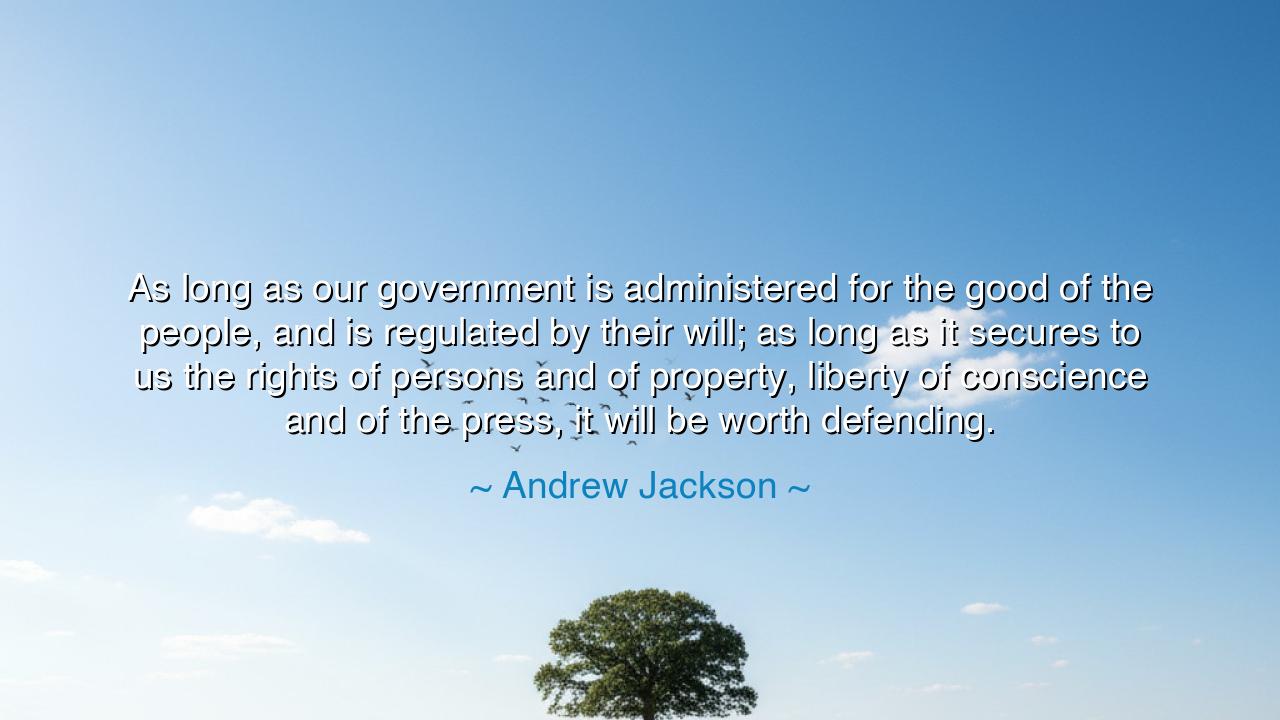
As long as our government is administered for the good of the
As long as our government is administered for the good of the people, and is regulated by their will; as long as it secures to us the rights of persons and of property, liberty of conscience and of the press, it will be worth defending.






The words of Andrew Jackson, the seventh President of the United States and a man of unyielding will, carry both warning and reverence: “As long as our government is administered for the good of the people, and is regulated by their will; as long as it secures to us the rights of persons and of property, liberty of conscience and of the press, it will be worth defending.” In this declaration, Jackson spoke not merely as a leader of his age, but as a guardian of the eternal covenant between freedom and responsibility. His voice, shaped by war, hardship, and the raw struggles of a young nation, reminds us that government, to be sacred, must always remain the servant of the people, not their master.
At its core, this quote is a defense of democracy’s moral foundation. Jackson teaches that a government earns its worth not from its grandeur, its armies, or its wealth, but from its faithfulness to justice, liberty, and the common good. The phrase “administered for the good of the people” is not mere rhetoric—it is the essence of republican virtue. When power serves only itself, tyranny is born; but when it serves the many, it becomes noble. Jackson’s words are thus a reminder that the true strength of a nation does not lie in its rulers, but in the purity of its purpose: to protect the rights of persons, the security of property, and the freedom of conscience and press—those eternal pillars upon which civilization rests.
The origin of this statement lies in the turbulent era of Jacksonian democracy. It was a time when America stood at a crossroads—divided between the ideals of equality and the dangers of elitism. Jackson, himself a man of humble beginnings, rose from frontier poverty to the highest office in the land. He carried with him the fierce belief that government must always answer to the people, not to the aristocracy of wealth or the cunning of privilege. His words were forged in an age of banking monopolies, political corruption, and the growing divide between ordinary citizens and the powerful few. To him, defending the government meant defending the principles upon which it was founded, not the ambitions of those who sought to twist it for personal gain.
History, ever the stern teacher, has shown the truth of Jackson’s warning. When a government ceases to be “regulated by the people’s will,” it begins to rot from within. Consider the fall of the Roman Republic—once a beacon of civic virtue, undone by greed, ambition, and the concentration of power in the hands of the few. Its leaders no longer governed for the good of the people, but for the glory of themselves. The rights of citizens became a memory, and liberty itself a casualty of corruption. Jackson’s words echo across centuries, a reminder that democracy is not self-sustaining—it must be guarded, nourished, and constantly renewed through the vigilance of the people.
But there is more to Jackson’s insight than mere warning; it is also a call to devotion. He speaks of a government “worth defending,” for not all governments are. A nation that tramples liberty, censors truth, or plunders its own people does not deserve allegiance—it deserves reform or resistance. Yet a government that upholds liberty of conscience, that protects the right to speak, believe, and build freely—such a government becomes the earthly vessel of moral order. To defend it is not a political act, but a sacred duty. It is the defense of humanity itself, for without freedom of conscience and truth, man becomes but a shadow of his divine potential.
Jackson’s conviction came from experience. He had seen both the chaos of anarchy and the cruelty of power unrestrained. As a soldier, he fought to preserve his nation’s independence; as president, he sought to preserve its spirit. He understood that government, like fire, is both servant and danger—useful when contained by the will of the people, but destructive when left unchecked. His reverence for liberty was not abstract but earned—through battle, loss, and the burden of leadership. Thus, his words are not the polished rhetoric of a statesman, but the rough, enduring wisdom of a man who had felt the weight of freedom’s cost.
The lesson is timeless: freedom is worth defending only when it defends us in return. A people who wish to preserve liberty must hold their leaders accountable, cherish the press that speaks truth, and protect the conscience that guides their moral compass. The moment government forgets its duty to serve the people, it ceases to be their protector and becomes their oppressor. But so long as it upholds justice and shields liberty, it is the duty of every citizen—farmer, scholar, worker, and soldier—to stand in its defense.
So let Jackson’s words ring through the centuries like the tolling of a great bell: as long as government guards the people’s rights and obeys their will, it is holy; and as long as liberty lives beneath its banner, it is worth our blood and our breath. Let every generation remember that the price of freedom is not only vigilance but gratitude—that to live in a just nation is a gift, and to defend it is the highest act of honor.






AAdministratorAdministrator
Welcome, honored guests. Please leave a comment, we will respond soon